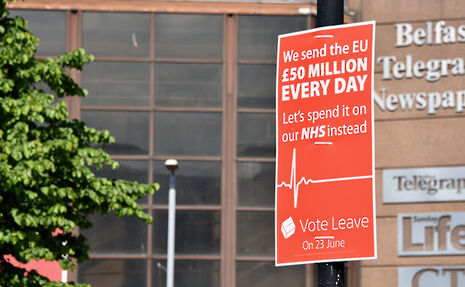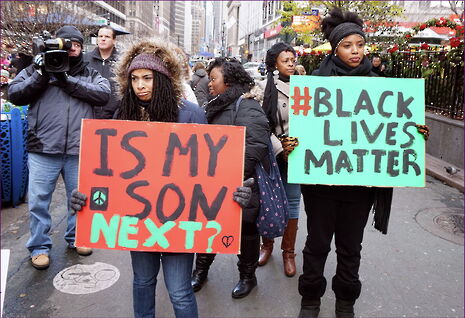How our clickbait culture is changing the face of politics
The ‘not particularly tech-savvy’ Polly Evans begins her column by examining the impact that new technologies have upon our experiences and relations with the world of politics

New technologies have entered every aspect of our lives, from our dating habits to what we eat, promising to make everything quicker, easier and more efficient. In 2016, we’ve witnessed the political repercussions of making information bite-sized, manifesting itself through Britain’s divisive Brexit campaign and Trump’s victory. Both of these relied on partial facts and juicy giblets of truth being shared and regurgitated before they were ever properly cross-checked. Often these were propagated in the form of witty memes, 140-character responses and sensationalist Facebook posts.
The Oxford English Dictionary didn’t make 2016’s word of the year ‘post-truth’ for nothing. These campaigns are both testaments to the notion that facts are no longer relevant unless they are compressed into an easily accessible package. According to information gathered in a 2015 study by the Reuters Institute for the Study of Journalism, people between the ages of 18 and 24 are the most likely age group to gain their news from ‘any online source’, supporting the assertion of this clickbait culture. But what are the long-term consequences of this, and how can we prevent ourselves being complicit?
“I can’t help but wonder whether there is something democratising about the way new technologies provide and circulate news.”
I’ve definitely been guilty of sharing unverified facts. Fairly recently I emailed my mum a picture I’d seen circling around my news feed that some of you might be familiar with. It portrayed an image of a younger Donald Trump accompanied by the quote: “If I were to run, I’d run as a Republican. They are the dumbest group of voters in the country. They believe anything on Fox News. I could lie and they’d still eat it up. I bet my numbers would be terrific.”
My mum then sent it around to her friends, and one of them replied saying that Trump had never actually said this. I immediately felt embarrassed to have shared something false. Yet it’s also unrealistic to expect everybody to fact-check all of the information we come across, so whom do we hold responsible for regulating the information we share?

Olivia Solon has recently written a brilliant article in The Guardian exploring how the proliferation of fake news affected the American general election. In it she notes how Facebook cleverly shirks any responsibility by labelling itself a ‘neutral technology platform’ and not a media company. It seems that Facebook has not yet reconciled its public perception as a legitimate media source with its inability to regulate information. Part of the problem with using Facebook as a source of information is that your news feed becomes simply the like-minded opinions of those around you. In this sense, everybody is merely preaching to the choir and there is little space for opposition. This results in a simplified and increasingly polarised type of politics which is insular and divisive.
Having said that, I can’t help but wonder whether there is something democratising about the way new technologies provide and circulate news. For the first time in the 21st century, thanks to platforms like Facebook and Twitter, everyone can be a journalist or a politician regardless of their background. Behind a screen, race, ethnicity and even physical location cease to be barriers and, as long as you have an iPhone or equivalent, you’re supplied with a political platform. There is something incredibly powerful in the idea of a group of people from disparate communities unified by one hashtag – Black Lives Matter to name but one. It’s also never been easier to record and live stream events across the world – from hate crimes to the atrocities in Aleppo, everybody is a witness. Does this bring us closer to an era of truth than ever before?
“This results in a simplified and increasingly polarised type of politics which is insular and divisive.”
Of course, footage can be manipulated and quotes taken out of context, and engaging in one-click political discourse doesn’t necessarily relate to any practical engagement. This is one of the main criticisms levelled against what has been dubbed ‘slacktivism’ – it might feel good to sign an Avaaz petition, but how many of us ever actually follow up whether or not the motion goes to parliament?
There have been studies which contest this notion that Facebook merely engenders political laziness. One of these, published in Nature, supposedly proves that around 340,000 extra people turned out to vote in the 2010 US congressional elections because of a single election-day Facebook voting reminder. We might also want to think about exactly what ‘activism’ means. If helping to build a global consciousness counts as being politically active, then we might have cause to be more optimistic about the future of online politics. Leo Mirani vehemently supports this idea, and in one article he powerfully argues: “if activism extends to changing the minds of people, to making populations aware of what their governments are doing in their name, to influencing opinion across the world, then the revolution will indeed be tweeted.”
I, personally, am not convinced by the slightly embarrassing ‘smart phones, dumb people’ mantra that is often bandied around in response to these questions. Of course we are smart, but how do we remember to stay ‘woke’? Do we train ourselves to become immune to the persuasions of obvious clickbait news and untrustworthy sources, do we mentally register which media platforms we can trust and which we can’t, or should we rely on government bodies to regulate influential media platforms like Facebook?
It feels like it’s getting harder and harder to know exactly what information we can trust, but I’ve learnt the embarrassing way that Facebook memes probably aren’t the best sources of information. And to be honest, neither is this article, but I’ll leave you to make up your own mind. If you do, send me a tweet.
 Comment / Anti-trans societies won’t make women safer14 November 2025
Comment / Anti-trans societies won’t make women safer14 November 2025 News / Controversial women’s society receives over £13,000 in donations14 November 2025
News / Controversial women’s society receives over £13,000 in donations14 November 2025 Comment / Be mindful of non-students in your societies12 November 2025
Comment / Be mindful of non-students in your societies12 November 2025 Theatre / The sultry illusions and shattered selves of A Streetcar Named Desire13 November 2025
Theatre / The sultry illusions and shattered selves of A Streetcar Named Desire13 November 2025 News / Stolen plate returned to Caius after 115 years12 November 2025
News / Stolen plate returned to Caius after 115 years12 November 2025









